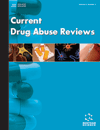-
oa Editorial [Current Drug Abuse - Time to be Reviewed]
- Source: Current Drug Abuse Reviews, Volume 1, Issue 1, Jan 2008, p. 1 - 2
-
- 01 Jan 2008
Abstract
Literature that makes note of addiction and drug abuse goes back to ancient times. Alcohol was used in Egypt since the time of the Pharaohs [1] and ancient Greeks were already experienced with alcohol abuse and alcoholism [2, 3]. Ancient Greeks were also familiar with cannabis, and myths talk about nepenthes: a mysterious drug against any type of pain [4]. Throughout history, the use and abuse of alcohol and drugs has been playing a role in society. In 1929, one of the first scientific papers in the field of addiction was published in the January issue of Science [5]. The paper revealed that a Committee on Drug Addiction was appointed in the USA to study the increasing problems related to drug addiction. Their most important goal was to substitute all existing addictive medicinal drugs such as morphine and cocaine by non-addictive alternatives with an equal clinical efficacy. To this extend the Universities of Virginia and Michigan took a leading role in developing and testing a series of new chemical compounds that should replace the addictive drugs. Although the aims of the Committee were very ambitious, and cocaine has been largely banned from the medical profession, a search of the scientific literature reveals only few articles on addiction. In fact, until the end of the 1980s research on addiction resulted in about 100 scientific papers yearly or less, focusing primarily on treatment and prevention. As is evident from Fig. 1, during the 1990s addiction research expanded rapidly. Until the 1990s, articles on addiction and drug abuse were scattered among the scientific literature. Thereafter the number of Universities and institutes involved in addiction research grew significantly, and currently there are about 30 international peerreviewed journals devoted to drug abuse and addiction. The number of review papers and meta-analyses increased as well during the last decade. To summarize the accumulative number of research papers that is currently emerging, the Journal Current Drug Abuse Reviews aims to publish the highest quality reviews and meta-analyses on all latest advances on alcohol and drug abuse and addiction. The Journal has a multidisciplinary scope and covers all the latest and outstanding developments in neurobiology, neuropsychopharmacology, addiction, behavioral effects, prevention, and treatment strategies on abuse of alcohol and both illicit and prescription drugs. The goal of the Journal is to be a reference source for anyone who wants a systematic overview of the available scientific evidence on topics related to drug abuse and addiction. This inaugural issue comprises a number of superb reviews that are all related to three main topics: alcohol, learning and memory, and adolescence. I will highlight some of these reviews, because they address topics that have been somewhat overlooked by researchers over the last decades. For example, one review discusses the fact that some drinkers never report having an alcohol hangover, whereas this would be expected after a session of heavy drinking. The alcohol hangover is an exciting yet puzzling phenomenon since it remains to be elucidated why these symptoms are present after alcohol and it metabolites (e.g., acetaldehyde) are eliminated from the body. Unlike alcohol intoxication, the pathology of alcohol hangover has received very little scientific attention and studies that have been performed often yield inconclusive results [6]. The lack of scientific interest in the intriguing issue of alcohol hangovers is remarkable, since almost every drinker is familiar with the unpleasant hangover effects that may arise the day after an evening of excessive drinking, and the ways these symptoms may affect performance of (or even participation in) planned activities the day after drinking. The debate on alcohol hangovers will continue until research provides us with a clear view of its pathology. Simple explanations as if hangover is equivalent to dehydration or caused by the presence of acetaldehyde have proven to be insufficient to explain the general feeling of misery the day after excessive drinking. Hence, although experienced by many drinkers, it is still unknown what causes the alcohol hangover, a fact that is illustrated by the lack of effective hangover cures [7]. Until the pathology of hangovers is elucidated, the reasons why some drinkers never experience alcohol hangovers will probably remain a mystery.


